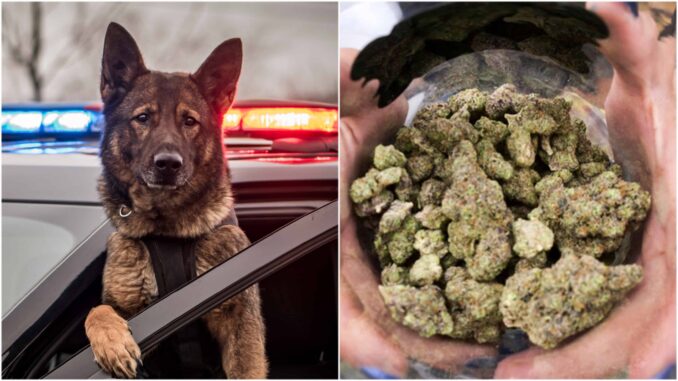
[ad_1]
Minnesota legalized cannabis, and as a result, some dogs are out of a job. Canine officers such as Jango, a 9-year-old German shepherd, and Cobra, a 10-year-old Belgian Malinois, are set to retire soon after the law goes into effect on August 1, Capt. Ryan Mangan said, according to USA Today.
These pups are the Olmsted County Sheriff’s Office’s only K-9s left trained to detect cannabis. Police dogs across the country are losing work as departments like Mangan’s no longer teach them how to smell your weed. If cannabis legalization continues to spread, it’s likely that these departments will never offer this class again. Meanwhile, cats are curled up at home, unaware that some animals actually have to work for a living.
Jango and Cobra are good old dogs (even police dogs are good dogs) already at the end of their careers. Their early retirement, which they get to begin enjoying after switching departments into patrol work, starts in September. Congrats to Jango and Cobra. If the Olmsted County Sheriff’s Office is reading this, please don’t forget to throw them a proper cop retirement party.
But while doggos like Jango and Cobra may be out of a job, police are still interested in the canine job market. There are still plenty of illegal drugs, from cocaine to opioids, for them to sniff out with their cute snouts. However, apparently, you can’t untrain a dog. So any canine officers who pick up the smell of weed are getting sacked. They could compromise searches and get human cops in trouble.
While police dogs’ ability to snitch based on smelling cannabis smoke has been well-utilized by police departments, the skill set came with risks even before cannabis legalization swept the country.
Cannabis is also now legal in Maryland. According to Talbot County Sheriff Joe Gamble, per USA Today, a 2005 Supreme Court decision means that if a dog detects drugs during a traffic stop, the officer has probable cause to search your car without a warrant. He adds that when a dog smelled weed in his jurisdiction, it could often lead to the discovery of illegal firearms or other drugs.
However, should these searches lead to court, the search could be challenged if the dog was trained in detecting cannabis. This is why Raven, a very good Labrador retriever, was sent into retirement on July 1st. Then, there’s poor Kato, who was shuffled into patrol work just like Jango and Cobra in Minnesota. Kato now faces either retirement or being sold to a police department in a state where cannabis is still illegal.
“We just don’t need the headache of defense attorneys,” Gamble said.
Apparently, police dogs try very hard to be good police dogs and please their human cops. Lawrence Myers, a retired Auburn University professor who has studied detection dogs, told USA Today that while the dogs are a “great tool,” they are also susceptible to bias. A 2019 investigation by the Louisville Courier Journal found that in nearly half of the 139 traffic stops since 2017 in which drug K-9s suggested the presence of narcotics inside a vehicle, none were found.
“I’ve been an expert witness on I have no idea how many cases involving all sorts of things including drugs,” Myers said. “And in some cases, I’m afraid certain officers have viewed the dog as a search warrant on a leash.”
If you’d like to help a former cop dog, check out Mission K9. While many police pups are adopted by their handlers, the organization can even help you adopt a retired dog, in addition to offering rehabilitation services. Aside from helping these pups transition back to dog-civilian life, they even help rehabilitate the very brave police dogs who survived trauma while on the job.
[ad_2]
Source link

Soyez le premier à commenter